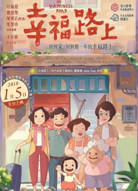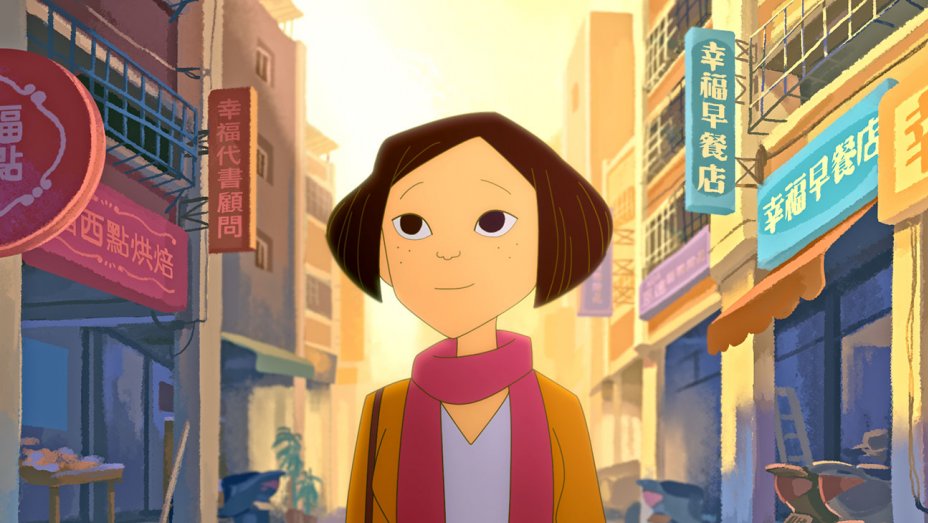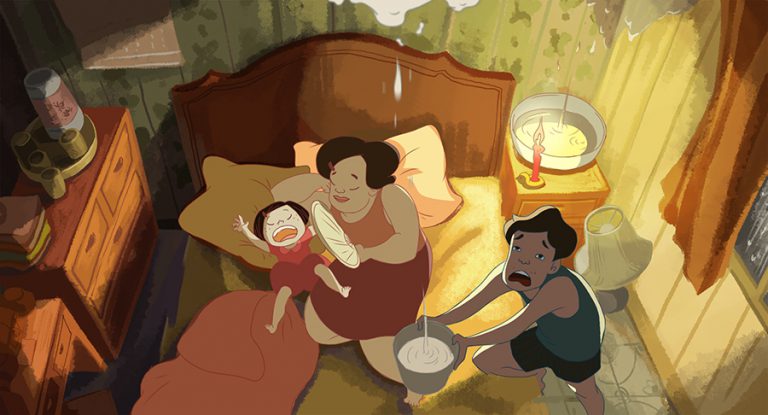The 2018 Animation Contenders: On Happiness Road
 Sunday, January 6, 2019 at 8:00AM
Sunday, January 6, 2019 at 8:00AM Each weekend, Tim has been taking a look at one of the films submitted for the Best Animated Feature Oscar.
 Taiwan's animation industry does not have a particularly strong reputation, to put it gently. For many years, the country's animation studios have largely served as inexpensive places to farm out work from other, more well-heeled companies, or to produce short films and clips that are largely ephemeral and quickly forgotten. So perhaps the first impressive thing about On Happiness Road is that it exists at all: a Taiwanese-produced feature-length animated film, about Taiwanese history and the cultural position of Taiwan in the wide world. That it is largely good is even more impressive.
Taiwan's animation industry does not have a particularly strong reputation, to put it gently. For many years, the country's animation studios have largely served as inexpensive places to farm out work from other, more well-heeled companies, or to produce short films and clips that are largely ephemeral and quickly forgotten. So perhaps the first impressive thing about On Happiness Road is that it exists at all: a Taiwanese-produced feature-length animated film, about Taiwanese history and the cultural position of Taiwan in the wide world. That it is largely good is even more impressive.
The film is the brainchild of writer-director Sung Hsin-Yin, making her first feature after a handful of short films. It tells the life story of Chi (voiced by Kwei Lun-Mi) a thirtysomething expatriate who returns from America to Taipei, where we immediately intuit she'd rather not be...

The reasons why she's come home, like the reasons for her discomfort, are unveiled slowly over the nearly two-hour film, as Chi finds herself helplessly reflecting on events from her childhood, when her younger self (Bella Wu) formed friendships, learned wisdom and received love from her grandmother (Giwas Gigo), and grew increasingly disenchanted with her parents.
"Adult child goes home, is immediately dumped subjectively into memories of the past" is an old topic, one that has been given very similar animated treatment in the magnificent Studio Ghibli feature Only Yesterday. But while that's the heart of On Happiness Road (a title obviously meant with a substantial dose of irony; it is in fact about learning to live with unhappiness), the film goes far beyond just depicting the psychological process of one woman. Chi and her family and friends are stand-ins for the modern social and political history of Taiwan. This could hardly be more explicit: Chi's birthday was 5 April 1975, the exact date of the death of Chiang Kai-shek, the military dictator whose passing led to a liberalization of culture. The film is very much about that liberalization, and the attempt by various individuals who represent different aspects of life in Taiwan, to find their right place in the world.
This is, if we're being perfectly honest, not always to the film's benefit. It's awfully schematic in its political metaphors. The story of present Chi being plagued by the memories of past Chi is strong enough on its own, with a rich enough depiction of the difficult relationships between adult children and their parents that it doesn't need much else. The political angle of the material is accomplished so heavily that it tends to crowd out the personal story. Chi's mixed-race friend, her lower-class friend, and her American husband all feel less like characters in a drama than abstracted representatives of social issues, underscored and capitalized and set off so that we understand the serious intent of all of of this, and appreciate the work that Sung has done in crafting an op-ed in dramatic, animated form. It drags down the rest of the movie, rendering parts of it more emotionally inert than they should be on their own merits. Besides, On Happiness Road certainly could do with being a bit more concise: at 110 minutes, it's hardly a ludicrously overlong film in and of itself, but those minutes are none too short.

Far better for the film when it's sticking with the tough matter of being a domestic drama and a character study. Chi is an interesting character with complicated problems, which the film presents with sympathy and understanding and no easy answers. Given this low-key psychological orientation, it's a film that wouldn't seem to demand animated treatment, but it benefits substantially from the style. Most obviously, the design of the film is full of bright, round, simplified characters, who have just enough distinctive facial features to be easily distinguished from each other, while they can be drawn with big emotional expressions that can be read in an instant. It's a childish aesthetic for a story entirely about adult concerns, and that tension itself feeds into Chi's fraught feelings about returning to her childhood home.
The animation itself isn't quite up to the standard of its design: while the film looks great in stills, On Happiness Road feels at least a little underwhelming in motion. The movement is noticeably stiff, sometimes as low as six frames per second. There's also something distinctively rigid in the characters' bodies, which feel like they've been assembled from modular pieces – the digital technology being used is undoubtedly a matter of industrial and economic necessity, but it works against the playful brightness of the drawings. The result is a film that, for all its charms, never quite looks right. Even so, the story is strong, and everything about the movie truly does feel unlike most of what's being produced in the rest of the world: this is a unique vision, well-executed, and it's an extremely promising debut.
previously
Lu Over the Wall
Early Man
Into the Spider-Verse
MKFZ
Tito and the Birds
The Night is Short Walk on Girl



Reader Comments (1)
As the child of parents from Taiwan, I am very interested in watching this film. I suppose I should import the DVD when it comes out there.